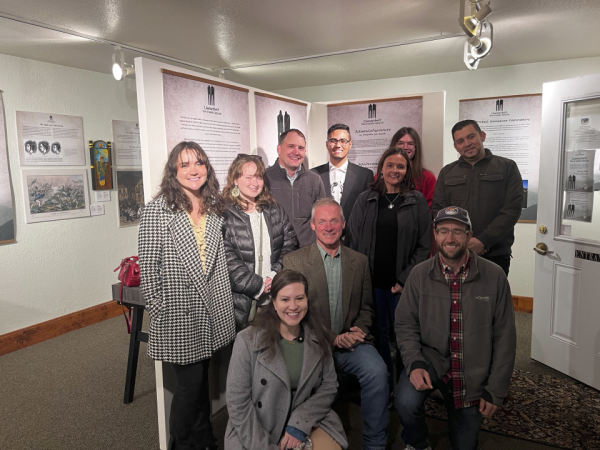
We are proud of our faculty and students who completed and worked on research in the 2023-2024 academic year. As our department values civic engagement and critical thinking, research is just one important way we see our faculty and students affect the world around them.
Student Research
This year, we had many students get involved with PRAXIS, the academic journal of the Department of Political Science. Our student editors, Jem Aspen and Chloe Ragsdale, worked with professor Jim Walsh to review many student submissions and work with 5 student authors on completing the editing cycle for publication. In the fall, students co-authored an article with professor Sasha Breger-Bush, assisted in the unveiling of the Irish Miners Memorial in Leadville with professor Jim Walsh, and in the spring, students presented at the student research symposium. Throughout the academic year, we had three research assistants studying the reintroduction of wolves to Colorado, and disinformation in the international arena with professor Christoph Stefes and professor Betcy Jose, and two fellows working on research on homelessness and hunger. Additionally, the Romero Theater Troupe performed skits and plays for the Colorado AFL-CIO, Adams 14 School District, Casa de Paz, and Service Employees International Union about labor history, police brutality, and welcoming migrants and refugees.
Faculty Research
This fall, Karen Sugar gave a guest lecture at GSU, Betcy Jose wrote a memorandum helping nearly 100 Afghan asylum-seekers, Christoph Stefes co-authored an article on policy feedback and international wildlife treaties in Germany, Martin Widzer published an article on the Palestinian divide, Betcy Jose was interviewed on the Israel-Palestine Conflict, and Sasha Breger-Bush was interviewed about the global debt crisis on The Free Mind Podcast.
This spring, Turan Kayaolgu published on Turkey's NHRI and Human Rights, Steve DelCastillo was a principle investigator for a research project examining barriers and opportunities for Latino students, parents and staff within Denver Public Schools, and Sasha Breger-Bush wrote an article on shared governance in higher education.
There are so many talks, articles, and events our faculty and students produce, and we recognize we may not be able to capture them all. This article is but an overview of the research and community engagement endeavors of political science students and faculty this academic year. We are so proud of our students and faculty for doing this important work, and we look forward to what the next academic year will bring!
